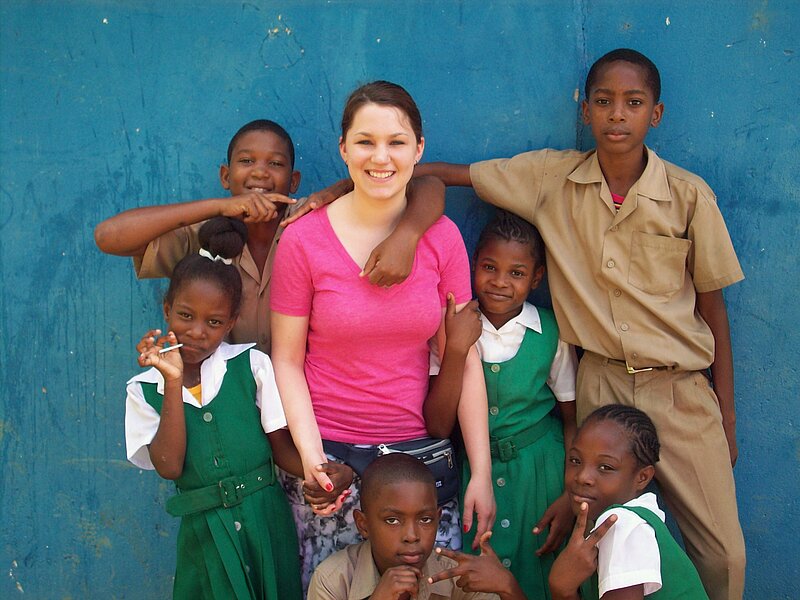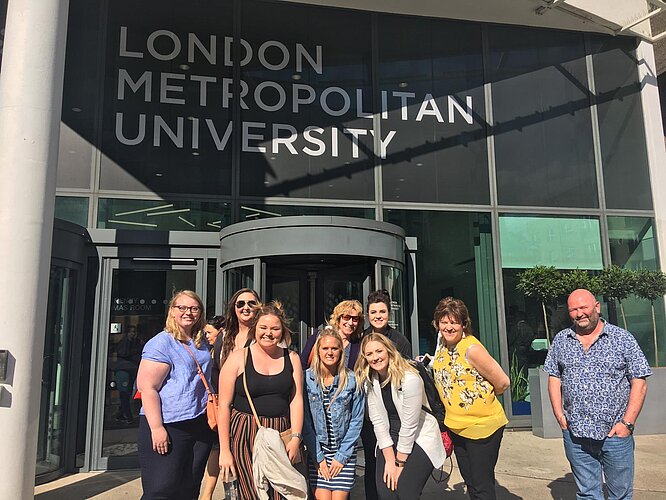International Scholar Spotlight

Over the past two years, Professor Brenda Hall has developed and led three study abroad programs for graduate students in the Counselor Education Program, School of Education. In recognition of her sustained efforts in international education and global engagement, Professor Hall received the Exceptional Contributions towards Internationalization Award at the HSE Staff and Faculty Recognition and Awards Ceremony held on May 11, 2020.
We asked Professor Hall to share some of her experiences in working on these programs, as well as to offer some recommendations to faculty members in our college who would like to become more active in international activities. Her stories related to the design of these programs and the experiences abroad she and her students shared are accompanied here by a few pictures taken during her travels. Below, read Professor Hall’s account in her own words.
International Activities and Engagement
I have had the fortune to recently engage in three international projects: two teaching experiences, and a research collaboration.
Teaching
Working with Ph.D. students, I developed and taught two study abroad courses. The first was during the Spring 2016 semester (April 30-May 7, 2016), as part of the course titled CNED 790 Counseling in Jamaica: An Immersive Experience.
This course provides students with a theoretical and practical understanding of counseling from a different cultural perspective as well as an understanding of multicultural and pluralistic trends, including characteristics and concerns between and within diverse groups nationally and internationally. A major emphasis is on counselors’ roles in advocacy, processes of oppression, and culturally supported services for individuals and communities. In addition to the assignments in class, this course includes an eight-day experience living with families in a Jamaican village and participating in a variety of community and school meetings and projects. Students also have the opportunity to visit with instructors, students, and administrators at Northern Caribbean University.

The second study abroad class was during the Summer 2019 semester (May 18-25, 2019). We developed a partnership with trainers from the Child Bereavement Center, in London, the United Kingdom (UK).
This course introduces students to the concepts of death, dying, grief, and loss as they relate to children, adolescents, and their families. Specifically focusing on the implications for counselors in both the clinical and school settings, this course provides opportunities for professionals to explore the impact of grief and loss while also providing insight into one’s theory and practice. Students obtain information on different types of loss including sudden and traumatic loss, terminal prognoses, and the impact of grief and loss on one’s professional identity. Students in this course gain knowledge from classroom content and activities, and through training opportunities at the Child Bereavement Center.

Research Collaboration
Using funding from a College of Human Sciences and Education grant, Ph.D. student Jessica Hotchkiss and I embarked on a research project with a colleague in England, Paula Abramson. Ms. Abramson is a licensed psychologist, formerly of Child Bereavement UK and the founder of Bereavement Training International, based in the UK. The title of the Project is “Growing toward bereavement: Exploring the lived experiences of children’s hospice bereavement professionals.”
For our study, we interviewed 14 bereavement professionals about their experiences related to preparation, education and their overall day-to-day work. The interviewees had different titles, but shared a common role to provide support and enhance the emotional well-being of children, young people and families. The UK has a strong history and background with children's hospices. We anticipate that by conducting research in this area we will understand more clearly how to help and support families through grief, death and dying. Children’s hospice care in the UK may serve as a model for other countries, such as the USA. This project is ongoing with future research planned.

Benefits of International Experiences
International connections can bring attention to the best assets of our department, college, and NDSU. They also allow visiting scholars to share their areas of expertise, and possibly visit our campus. Our research colleague in England is very interested in conducting training for any interested parties at NDSU. In other words, international connections provide great networking for students and faculty.
In retrospect, the students became part of a community experience. They engaged in service and learning from the perspective and needs of community residents, not simply as outsiders bringing learning to the community. By traveling and experiencing different languages, different values, different traditions, and different educational practices students have an opportunity to broaden their self-awareness and cultural humility.
The students in the study abroad courses had an opportunity to apply aspects of counseling training, and compare their courses, and other learning experiences with those students studying similar subjects in another country. This may allow for additional exchanges of students, knowledge, and research projects at the department and college level.
Challenges of Developing International Collaborations
Setting up trips and scheduling trainings that involve groups of students can be challenging. Working with the Study Abroad Office on campus is helpful, and I would recommend, if possible, work with an outside entity that is in the business of international service learning or educational training planning. Be careful, though, and make sure to speak to others who have used anyone you consider.
Funding is always a challenge, but our college awards such as the James Lebedeff Endowed Professorship Awards are available for international research and training.
As a faculty member, I wish I had engaged in international study abroad and research collaboration earlier in my career. I think it takes time to develop collaborations, but the benefits are great. When Jessica and I planned the study abroad trip to the Child Bereavement Center training, we did not realize that we would be back in London in January to conduct research. Our study developed from conversations with our trainers and interactions with Paula. She was impressed with the interest of our students and Jessica, my doctoral student, who was willing to share her passion for working with bereaved families. Several of our students commented that they plan to pursue more international travel and collaborations.


